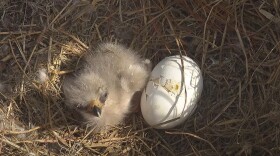Students at Canterbury School have been waiting months to talk with astronauts aboard the International Space Station.
And the first question asked by 3-year-old Nina was a culinary query.
Her question, “can you eat cupcakes in space?” was made possible thanks to the Amateur Radio on the International Space Station (ARISS) program, where schools propose a project to then speak with astronauts aboard the ISS.
Canterbury is one of eight schools in the world to have this opportunity right now. Dubbed the “Semester in Space,” all of Canterbury's 2022 Fall curriculum surrounds STEM and outer space discovery to inspire student interest in math and sciences.
For 17-year-old JJ Ignac and his small team of Canterbury seniors, that involved building the satellite tracking antenna that made today’s contact possible. He says making contact is an experience he won’t soon forget.
“I’m here perfect time, perfect place in order to do something like this, so it’s a remarkable opportunity.” said Ignac.
With a mind for engineering and robotics, Ignac plans to pursue a career in STEM at the University of Pennsylvania. This trajectory is exactly what the AISS program is geared to encourage.
Christiana Deeter, science department head for Canterbury schools, says the plan is to keep the radio station going for years to come, starting with JJ’s team.
“Their job right now is recruiting younger kids to show them how, what new equipment they might make, or different antennas that they might be able to build to do different sorts of radio experiences,” said Deeter.
And JJ takes this responsibility seriously. He has dubbed his team the "Satellite Tracking Antenna Crew" or "S.T.A.C.K" and knows his hard work now will benefit space explorers of the future.
“I want that to continue through the school's history and so that it's the idea of planting a tree even though you know that you will not be able to enjoy the shade it makes,” said Ignac.
If you're wondering the answer to the cupcake question, NASA astronaut Josh Cassada says they don’t have an oven on the ISS, but they do have cake in a tube that comes pretty close.
WGCU is your trusted source for news and information in Southwest Florida. We are a nonprofit public service, and your support is more critical than ever. Keep public media strong and donate now. Thank you.








